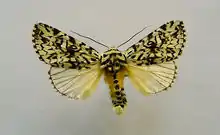Trichosea ludifica
Trichosea ludifica is a moth of the family Noctuidae. The species was first described by Carl Linnaeus in his 1758 10th edition of Systema Naturae.[1][2] It is the type species of the genus Trichosea. It is found in the mountainous areas of central Europe, especially in western and northern Germany and the Bavarian Alps.
| Trichosea ludifica | |
|---|---|
 | |
| Scientific classification | |
| Kingdom: | |
| Phylum: | |
| Class: | |
| Order: | |
| Family: | |
| Genus: | |
| Species: | T. ludifica |
| Binomial name | |
| Trichosea ludifica | |
The wingspan is 42–50 mm. The moths are on wing from May to June and again from August to September depending on the location.
The larvae feed on Betula and Crataegus species, as well as Malus domestica and Sorbus aucuparia.
References
- Beccaloni, G.; Scoble, M.; Kitching, I.; Simonsen, T.; Robinson, G.; Pitkin, B.; Hine, A.; Lyal, C., eds. (2003). "Trichosea ludifica". The Global Lepidoptera Names Index. Natural History Museum. Retrieved April 27, 2020.
- Savela, Markku (May 30, 2019). "Trichosea ludifica (Linnaeus, 1758)". Lepidoptera and Some Other Life Forms. Retrieved April 27, 2020.
External links
| Wikimedia Commons has media related to Trichosea ludifica. |
- "Trichosea ludifica (Linnaeus, 1758)". Fauna Europaea. Retrieved April 27, 2020.
- "10370 Trichosea ludifica (Linnaeus, 1758) - Gelber Hermelin". Lepiforum e. V. Retrieved April 27, 2020. (in German)
- "Trichosea ludifica (Linnaeus, 1758)". Schmetterlinge-Deutschlands.de. Retrieved April 27, 2020. (in German)
This article is issued from Wikipedia. The text is licensed under Creative Commons - Attribution - Sharealike. Additional terms may apply for the media files.